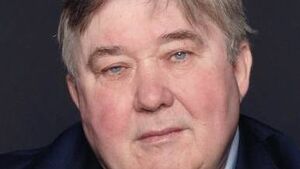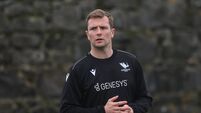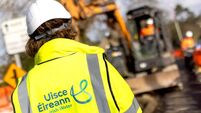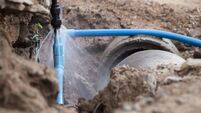'For two London boys, Kiltimagh was a wondrous place'

Author and journalist Philip Stephens.
As a senior commentator with the , Philip Stephens has spent decades analysing the great political shifts between Britain and Europe. His latest book, , examines the complex ties between Ireland and Britain - ties that, for Stephens, are not only historical and political but deeply personal.
Although born in London to an Irish mother and Welsh father, Philip spent long childhood summers in Kiltimagh, where his grandparents lived. Those visits, stretching from the mid-1950s into the late 1960s, shaped his identity, gave him a lifelong connection to Mayo, and now form a vivid thread in his reflections on what it means to be both Irish and British.
“My first clear memories of Ireland are from when I was about six or seven, at the end of the 1950s,” Philip told the . “We’d set off from Euston Station in London in the evening, my mother, my older brother Paul and me. My father stayed behind for work.
"The train was always crowded and chaotic. Then came the night boat from Holyhead, arriving in Dublin at dawn.”
From there, the family made the long trek westwards. “We had to cross Dublin to reach Heuston Station and take the train to Claremorris. In those days, you could continue on to Kiltimagh itself, but later the station closed and we’d take a bus instead.
"It was always a long journey, but for us children, it was the gateway to freedom.”
And freedom was the word.
“Coming from a big city, what struck me in Kiltimagh was the freedom to roam. My mother was perfectly content for us to disappear after breakfast with a bit of soda bread and cheese and not return until teatime.
"We’d spend hours at the ball alley, swim in the river, walk in the mountain, and play with friends we made in the town. Everyone knew who we were, and though we were called ‘the English boys’, we were never strangers.”
Philip's mother, Theresa Martin, grew up in Kiltimagh before emigrating to London in the late 1940s.
“She had left school at 14, got a typing qualification, and found secretarial work in London. That’s where she met my father, who was Welsh.”
His maternal grandfather, John Martin, was a tailor based on James’ Street in Kiltimagh. Several of his mother’s siblings entered religious life.
“Two of my uncles became Holy Ghost Fathers. One worked for many years in Africa, in what was then the Gold Coast, while the other was involved in education in Ireland. He only passed away last year. My aunt, Sister Mary Enda, was with the Holy Rosary Sisters and spent most of her life on mission in South Africa.”
His grandmother’s family were Costellos, with strong local ties.
“They had a bicycle shop in town and relations on farms outside. They were also connected to the Higgins family. I had cousins across the road, and we’d spend time on their land.”
The Martins and Costellos were well-known names in Kiltimagh, and Philip remembers his grandparents’ modest home vividly.
“They were very poor, by comparison with our life in London. It was a house with no bathroom and an outside privy. In London, we lived in a social housing flat that, by the standards of the time, was modern and had proper facilities.
"As a child, I didn’t notice the difference - only later did I find it striking. But it never dampened my enthusiasm for Kiltimagh.”
Philip reels off the names of friends from those long summers.
“Next door to my grandparents lived the Jordan family, who ran a general store. I knew the children well, and I actually met one of them, Tom Jordan, again quite recently. Then there was the Roughneen family and we were friends with the Walshs, who had the pub on the corner, and the Meenaghans further down town. We had a whole set of friends and spent so much time together at the ball alley or wandering the countryside.”
He remembers the social life of Kiltimagh too.
“As teenagers, we went to the dances in the ballroom. I had a crush on a girl there who I wrote to for years afterwards - but I won’t name her!” he laughs. “My brother had his own crush as well. It was all part of growing up.”
Those visits continued until the late 1960s when school exams, university and new opportunities took over.
“I suppose we stopped going regularly when we were 15 or 16. My brother announced one year that he was going to Spain with friends instead, and that was that.”
Although Philip built his life and career in Britain, the Mayo summers gave him a strong Irish identity.
“I never really felt English. I always thought of myself as Irish as well as British,” he says. “After my mother died in the 1990s, I applied for an Irish passport to hold on to the connection and to honour her memory. I’ve passed that on to my children too. They’re both Irish citizens as well as British.”
For him, the Irish connection is about personal identity rather than professional life.
“It shaped me as a person. It gave me a sense of belonging and of being both Irish and British. That’s something I’ve wanted to hold on to.”
, the second book in Philip's planned trilogy on Britain’s place in the world, interweaves these personal memories with an analysis of Anglo-Irish relations. The first volume, ‘Britain Alone’, examined Britain’s post-Suez decline, while the final, yet-to-be-written instalment will cover relations with the United States.
In , Philip charts the story of Irish emigration to Britain, the discrimination Irish people sometimes faced, and the gradual integration that followed. He argues that the Belfast Agreement marked a turning point, allowing both nations to build a future free of old antagonisms. Queen Elizabeth’s 2011 state visit to Dublin was, for him, a high point of reconciliation. But he believes Brexit undid much of that progress.
“The Brexiteers showed ignorance and indifference to Ireland. Boris Johnson in particular treated Northern Ireland as an inconvenience. The sense of respect built over decades was squandered.”
Philip sees growing support for Irish unity, but he argues that Scotland will leave the UK before Northern Ireland joins the Republic.
“The more often I go to Scotland, the more I realise it feels like a different country. It is growing apart.”
He also highlights emerging tensions between Ireland and Britain over neutrality and defence.
“The idea that neutrality is a pillar of Irish independence no longer holds, if it ever did. Ireland can’t just be a bystander in a world of Putin and Russia. While no one expects Ireland to send troops around the world, relying on the security umbrella of others will cause friction.”
Philip is proud to see Kiltimagh’s place in wider Irish history too.
“When I was back last year, I learned that Michael Collins used to hide out there because his sister was a teacher in Bohola. He would stay in a shop on the main street. I also heard about one of de Valera’s close friends who lived near the church - they had known each other from school in Blackrock, and de Valera would spend time in Kiltimagh as a result. So the two great figures of independence, Collins and de Valera, both had connections to the town. I found that fascinating.”
Now aged 72, Philip looks back on his Mayo summers with warmth and gratitude.
“Those summers shaped who I am. They didn’t determine my career, but they gave me something much more lasting - a sense of freedom, belonging, and identity. For two London boys, Kiltimagh was a wondrous place. It still is.”
Philip will be back in Kiltimagh on October 18th for the Mayo launch of his book and he will give a talk on his life in the local museum.





